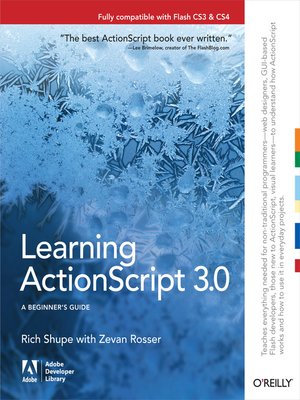Learning ActionScript 3.0
ebook ∣ The Non-Programmer's Guide to ActionScript 3.0 · Learning
By Rich Shupe

Sign up to save your library
With an OverDrive account, you can save your favorite libraries for at-a-glance information about availability. Find out more about OverDrive accounts.
Find this title in Libby, the library reading app by OverDrive.



Search for a digital library with this title
Title found at these libraries:
| Library Name | Distance |
|---|---|
| Loading... |
In this book, authors Rich Shupe and Zevan Rosser share the knowledge they've gained from their years as multimedia developers/designers and teachers. Learning ActionScript 3.0 gives you a solid foundation in the language of Flash and demonstrates how you can use it for practical, everyday projects.
The authors do more than just give you a collection of sample scripts. Written for those of you new to ActionScript 3.0, the book describes how ActionScript and Flash work, giving you a clear look into essential topics such as logic, event handling, displaying content, migrating legacy projects to ActionScript 3.0, classes, and much more. You will learn important techniques through hands-on exercises, and then build on those skills as chapters progress.
ActionScript 3.0 represents a significant change for many Flash users, and a steeper learning curve for the uninitiated. This book will help guide you through a variety of scripting scenarios. Rather than relying heavily on prior knowledge of object-oriented programming (OOP), topics are explained in focused examples that originate in the timeline, with optional companion classes for those already comfortable with their use. As chapters progress, the book introduces more and more OOP techniques, allowing you to choose which scripting approach you prefer.
Learning ActionScript 3.0 reveals:
- New ways to harness the power and performance of AS3
- Common mistakes that people make with the language
- Essential coverage of text, sound, video, XML, drawing with code, and more
- Migration issues from AS1 and AS2 to AS3
- Simultaneous development of procedural and object-oriented techniques
- Tips that go beyond simple script collections, including how to approach a project and which resources can help you along the way
Note: CD-ROM/DVD and other supplementary materials are not included.







